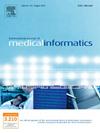探索临床和社会人口因素对中年自评健康的重要性:一项使用机器学习的横断面研究
IF 3.7
2区 医学
Q2 COMPUTER SCIENCE, INFORMATION SYSTEMS
International Journal of Medical Informatics
Pub Date : 2025-02-10
DOI:10.1016/j.ijmedinf.2025.105834
引用次数: 0
摘要
背景自评健康(SRH)受多种因素的影响,包括临床和社会人口特征。然而,在巴西的背景下,我们仍然缺乏对这些因素的相对重要性的清晰认识,以及它们在中年男性和女性之间的差异。鉴于两性平等在保健方面的重要性,探讨这些差异以满足每个群体的具体需要至关重要。目的:本研究探讨巴西中年成人SRH的临床和社会人口学因素的重要性,并分析这些因素在男性和女性之间的差异。方法使用2019年全国健康调查(PNS)的数据进行横断面分析,其中有代表性的样本是巴西境内居住在私人家庭中的31,926名中年人(40-59岁)。采用朴素贝叶斯、支持向量机、逻辑回归、随机森林和xgboost五种机器学习模型对数据进行分析。结果分析揭示了SRH预测因子的性别特异性模式。对于男性来说,教育程度是最关键的因素,其次是身体和精神疾病的诊断。对妇女而言,性健康和生殖健康主要受慢性病诊断、教育程度低和医疗保险覆盖率的影响。与女性相比,饮酒更能预测男性较差的性生殖健康状况,这可能是由于文化规范鼓励男性更多地饮酒。结论本研究揭示了中年健康差异,强调了影响性生殖健康的性别因素。机器学习在揭示健康数据中的细微模式方面展示了其价值,为公共卫生研究和政策提供了强大的工具。本文章由计算机程序翻译,如有差异,请以英文原文为准。
Exploring the importance of clinical and sociodemographic factors on self-rated health in midlife: A cross-sectional study using machine learning
Background
Self-rated health (SRH) is influenced by various factors, including clinical and sociodemographic characteristics. However, in the context of Brazil, we still lack a clear understanding of the relative importance of these factors and how they differ between men and women in midlife. Given the significance of gender equity in health, it is crucial to explore these differences to meet the specific needs of each group.
Objective
This study examines the importance of clinical and sociodemographic factors of SRH among middle-aged Brazilian adults and analyzes how they vary between men and women.
Methods
A cross-sectional analysis was conducted using data from the 2019 National Health Survey (PNS) with a representative sample of 31,926 middle-aged adults (40–59 years) living in private households on Brazilian territory. Five machine learning models—Naive Bayes, SVM, Logistic Regression, Random Forests, and XGBoost—were employed to analyze the data.
Results
The analysis revealed gender-specific patterns in SRH predictors. For men, education was the most critical factor, followed by diagnoses of physical and mental illnesses. For women, SRH was primarily influenced by chronic disease diagnoses, low education, and health insurance coverage. Alcohol consumption was a stronger predictor of poor SRH for men than women, likely due to cultural norms that promote higher alcohol use among men.
Conclusion
This study provides insights into midlife health disparities, emphasizing gender-specific factors influencing SRH. Machine learning demonstrated its value in uncovering nuanced patterns in health data, offering a powerful tool for public health research and policy.
求助全文
通过发布文献求助,成功后即可免费获取论文全文。
去求助
来源期刊

International Journal of Medical Informatics
医学-计算机:信息系统
CiteScore
8.90
自引率
4.10%
发文量
217
审稿时长
42 days
期刊介绍:
International Journal of Medical Informatics provides an international medium for dissemination of original results and interpretative reviews concerning the field of medical informatics. The Journal emphasizes the evaluation of systems in healthcare settings.
The scope of journal covers:
Information systems, including national or international registration systems, hospital information systems, departmental and/or physician''s office systems, document handling systems, electronic medical record systems, standardization, systems integration etc.;
Computer-aided medical decision support systems using heuristic, algorithmic and/or statistical methods as exemplified in decision theory, protocol development, artificial intelligence, etc.
Educational computer based programs pertaining to medical informatics or medicine in general;
Organizational, economic, social, clinical impact, ethical and cost-benefit aspects of IT applications in health care.
 求助内容:
求助内容: 应助结果提醒方式:
应助结果提醒方式:


